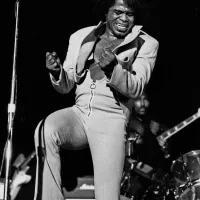Bob Seger is a retired American singer, songwriter, and musician. He started as a local Detroit artist, performing with Bob Seger and the Last Heard and the Bob Seger System in the 1960s, achieving initial success with "Ramblin' Gamblin' Man" in 1969. In the early 1970s, he pursued wider success. He formed the Silver Bullet Band in 1973, achieving national fame with the album Live Bullet (1976). He broke out nationally with the studio album Night Moves in 1976. Seger also collaborated with the Muscle Shoals Rhythm Section on several hit singles and albums.
May 6, 1945: Bob Seger's Birth
On May 6, 1945, Robert Clark Seger was born. He would later become a renowned singer, songwriter, and musician.
1956: Father abandoned family
In 1956, when Bob Seger was 10 years old, his father abandoned the family and moved to California, leading to financial struggles for the remaining family.
1957: First Record Purchase
In 1957, Bob Seger bought his first record, "Come Go with Me" by The Del-Vikings.
1961: Formation of The Decibels and First Radio Play
In 1961, Bob Seger formed The Decibels and recorded "The Lonely One", his first original song, which received its first (one-time) radio play on an Ann Arbor station.
1963: Graduation from Ann Arbor High School
In 1963, Bob Seger graduated from Ann Arbor High School, now known as Pioneer High School, in Ann Arbor, Michigan.
1963: Influence of Live at the Apollo
In 1963, Live at the Apollo by James Brown became Bob Seger and his friends' favorite record following its release.
1964: Influence of The Beatles
In 1964, Bob Seger was influenced by the music of The Beatles after they hit American shores.
1965: First Official Recording with Doug Brown and The Omens
In 1965, Bob Seger made his first appearance on an officially released recording, the single "TGIF" (backed with "First Girl"), credited to Doug Brown and The Omens.
1966: Release of "East Side Story"
In 1966, Bob Seger, as Bob Seger and the Last Heard, released "East Side Story" on Hideout Records, which became his first big Detroit hit.
1967: Release of "Heavy Music"
In 1967, Bob Seger and the Last Heard released "Heavy Music", which became a potential national breakout hit but was hampered by Cameo-Parkway going out of business.
1968: First marriage to Renee Andrietti
In 1968, Bob Seger married Renee Andrietti, but the marriage lasted for "one day short of a year."
1968: Release of "2 + 2 = ?"
In 1968, Bob Seger tackled antiestablishment themes in early songs such as "2 + 2 = ?".
1968: Signing with Capitol Records
In the spring of 1968, Bob Seger & the Last Heard signed with Capitol Records, choosing them over Motown Records because Seger felt Capitol was more appropriate for his genre.
1969: Release of Ramblin' Gamblin' Man Album
In 1969, Bob Seger achieved his initial breakthrough with the album "Ramblin' Gamblin' Man," which featured his inaugural national hit of the same title.
1969: Release and success of "Ramblin' Gamblin' Man"
In 1969, Bob Seger released "Ramblin' Gamblin' Man", which became a major hit in Michigan and his first nationwide hit, peaking at No. 17, leading to the release of an album of the same name.
1969: Release of Noah album and brief retirement
In 1969, The System released the album Noah, which failed to chart and led Bob Seger to briefly leave the music industry to attend college.
1970: Teegarden & Van Winkle hit with "God, Love, and Rock & Roll"
In 1970, Teegarden & Van Winkle had a hit with "God, Love, and Rock & Roll".
1970: Release of Mongrel and End of The System
In 1970, The Bob Seger System released its final album, Mongrel, featuring the single "Lucifer", but the album failed to sell. This marked the end of The System.
1971: Release of Brand New Morning and Departure from Capitol
In 1971, Bob Seger released his solo album, the all-acoustic Brand New Morning, which was a commercial failure and led to his departure from Capitol Records.
1972: Relationship with Jan Dinsdale begins
In 1972, Bob Seger began a long-term relationship with Jan Dinsdale.
1972: Release of Smokin' O.P.'s
In 1972, Bob Seger, with Teegarden & Van Winkle, released the album Smokin' O.P.'s on Palladium Records, featuring covers and a minor hit with "If I Were a Carpenter".
1972: David Teegarden plays drums on Smokin' O.P.'s
In 1972, David Teegarden was the drummer for Bob Seger's album "Smokin' O.P.'s". In February 1977, he replaced Charlie Allen Martin as the drummer for the Silver Bullet Band.
1972: Archival Material from Smokin' O.P.'s
In 2009, Bob Seger released a compilation album, Early Seger Vol. 1, containing archival material from 1972 album Smokin' O.P.'s.
1972: Touring with Teegarden & Van Winkle and Formation of My Band
Throughout most of 1972, Bob Seger toured with Teegarden & Van Winkle. After touring, Seger formed a new backing band referred to as My Band and the Borneo Band.
1973: Formation of the Silver Bullet Band
In 1973, Bob Seger formed the Silver Bullet Band with Detroit-area musicians.
1973: Release of Back in '72 and Collaboration with Muscle Shoals Rhythm Section
In 1973, Bob Seger released Back in '72, recorded partly with the Muscle Shoals Rhythm Section. This album featured studio versions of "Turn the Page" and "Rosalie".
1974: Release of "U.M.C. (Upper Middle Class)"
In 1974, Bob Seger tackled antiestablishment themes in early songs such as "U.M.C. (Upper Middle Class)".
1974: Archival Material from Seven
In 2009, Bob Seger released a compilation album, Early Seger Vol. 1, containing archival material from 1974 album Seven.
1974: Performances and the "Battle of the Bands"
Throughout 1974, Bob Seger performed in local venues around his hometown, including one renowned concert in Davisburg, Michigan, called the "Battle of the Bands".
September 1975: Recording of Live Bullet Album
In September 1975, Bob Seger and the Silver Bullet Band recorded the live album "Live Bullet" over two nights at Detroit's Cobo Arena, capturing performances of songs like "Nutbush City Limits" and "Turn the Page".
1975: Recording Live Bullet at Cobo Hall
In 1975, Bob Seger recorded the album Live Bullet live at Cobo Hall.
1975: Beautiful Loser Album Release
In 1975, Bob Seger released the album "Beautiful Loser". The success of Night Moves in 1976 boosted sales of Seger's previous releases, including Beautiful Loser, which eventually sold two million copies.
1975: Return to Capitol and Release of Beautiful Loser
In 1975, Bob Seger returned to Capitol Records and released the album Beautiful Loser, featuring the song "Katmandu" which was his first national break-out since "Ramblin' Gamblin' Man".
April 1976: Release of Live Bullet Album
In April 1976, Bob Seger and the Silver Bullet Band released "Live Bullet", a live album recorded at Detroit's Cobo Arena. The album featured Seger's rendition of "Nutbush City Limits", "Turn the Page", "Heavy Music", and "Ramblin' Gamblin' Man".
October 1976: Release of Night Moves Album
In October 1976, Bob Seger achieved commercial breakthrough with the release of his album "Night Moves." The title track became a hit, reaching No. 4 on the Billboard Pop Singles chart. The album also featured "Mainstreet" and "Rock and Roll Never Forgets".
1976: National Breakout with Night Moves
In 1976, Bob Seger achieved national recognition with the studio album Night Moves.
February 1977: Charlie Allen Martin's Accident
In February 1977, Charlie Allen Martin, the drummer for the Silver Bullet Band, was hit by a car and was left unable to walk. David Teegarden replaced him.
1978: Release of Stranger in Town Album
In 1978, Bob Seger released the album "Stranger in Town", which included the hit singles "Still the Same", "Hollywood Nights", and "We've Got Tonight". "Old Time Rock and Roll" was also featured on this album.
1979: Co-writing "Heartache Tonight" with the Eagles
In 1979, Bob Seger co-wrote the Eagles' No. 1 hit "Heartache Tonight" from their album The Long Run. The song was about Seger's and Glenn Frey's shared early lives in Detroit.
1981: Release of Nine Tonight Album
In 1981, Bob Seger released the live album "Nine Tonight", which captured the peak of his commercial career. Seger's rendition of "Tryin' to Live My Life Without You" became a Top Five hit from Nine Tonight.
December 1982: Release of The Distance Album
In December 1982, Bob Seger released "The Distance", an album praised for its versatile sound, including hits such as "Shame on the Moon", "Even Now", and "Roll Me Away".
1983: Relationship with Jan Dinsdale ends
In 1983, Bob Seger's relationship with Jan Dinsdale ended after starting in 1972.
1983: "We've Got Tonight" covered by Kenny Rogers and Sheena Easton
In 1983, Kenny Rogers and Sheena Easton covered Bob Seger's song "We've Got Tonight", and their rendition became a major hit, topping Billboard's Hot Country Songs.
1984: Recording "Understanding" for Teachers Soundtrack
In 1984, Bob Seger wrote and recorded the power rock ballad "Understanding" for the soundtrack of the movie Teachers. The song became a Top 20 hit.
1986: Release of Like a Rock Album and American Storm Tour Launch
In 1986, Bob Seger released the album "Like a Rock", featuring the hit song "American Storm". He also launched the American Storm Tour.
1986: Recording "Living Inside My Heart" for About Last Night... Soundtrack
In 1986, Bob Seger wrote and recorded the song "Living Inside My Heart" for the soundtrack of the movie About Last Night....
March 13, 1987: Star on the Hollywood Walk of Fame
On March 13, 1987, Bob Seger & the Silver Bullet Band received a star on the Hollywood Walk of Fame, located at 1750 Vine Street, for their contributions to the music industry.
1987: American Storm Tour
Bob Seger's 1986-1987 American Storm Tour was his self-stated last major tour, playing 105 shows over nine months and selling almost 1.5 million tickets.
1987: Marriage to Annette Sinclair
In 1987, Bob Seger married actress Annette Sinclair.
1987: Recording "Shakedown" for Beverly Hills Cop II Soundtrack
In 1987, Bob Seger recorded "Shakedown" for the soundtrack to Beverly Hills Cop II. The song became Seger's first and only No. 1 hit on the pop singles chart and earned him an Oscar nomination.
1987: Shakedown tops Billboard Hot 100
In 1987, Bob Seger's song "Shakedown", written for the movie Beverly Hills Cop II, topped the Billboard Hot 100 chart.
1991: Release of The Fire Inside Album
In 1991, Bob Seger released "The Fire Inside" album, facing challenges due to the popularity of glam metal, grunge, and alternative rock.
1993: Marriage to Juanita Dorricott
In 1993, Bob Seger married Juanita Dorricott in a private ceremony at The Village Club in Bloomfield Hills; they have two children together.
1994: Release of Greatest Hits Compilation Album
In 1994, Bob Seger released "Greatest Hits", a compilation album that became his biggest record in terms of sales.
1995: Release of It's a Mystery Album
In 1995, Bob Seger released the album "It's a Mystery", which was certified gold.
1996: 1996 Tour
Bob Seger went out for a 1996 tour, which sold the fourth-largest number of tickets of any North American tour that year.
1997: Sabbatical from the Music Business
From 1997, Bob Seger took a sabbatical from the music business to spend time with his wife and children.
2001: Won Port Huron to Mackinac Boat Race
In 2001, Bob Seger won the Port Huron to Mackinac Boat Race aboard his sailboat Lightning.
2001: "Old Time Rock and Roll" named Song of the Century
In 2001, Bob Seger's recording of "Old Time Rock and Roll" was named one of the Songs of the Century.
2002: Won Port Huron to Mackinac Boat Race
In 2002, Bob Seger again won the Port Huron to Mackinac Boat Race aboard his sailboat Lightning.
March 15, 2004: Induction into the Rock and Roll Hall of Fame
On March 15, 2004, Bob Seger was inducted into the Rock and Roll Hall of Fame. Fellow Detroiter Kid Rock gave the induction speech, and Michigan Governor Jennifer Granholm proclaimed the date Bob Seger Day.
2004: Induction into the Rock and Roll Hall of Fame
In 2004, Bob Seger was inducted into the Rock and Roll Hall of Fame.
2005: Induction into the Michigan Rock and Roll Legends Hall of Fame
In 2005, Bob Seger & the Silver Bullet Band were inducted into the Michigan Rock and Roll Legends Hall of Fame. Seger was also featured singing with 3 Doors Down on the song "Landing in London".
2006: Against the Wind and Stranger in Town sales certification
As of 2006, both Bob Seger's albums Stranger in Town and Against the Wind had sold over 5 million copies each in the United States.
2006: Certification of Night Moves and Stranger in Town
As of 2006, the album Night Moves was certified at 6 million copies in the United States. Seger's 1976 album Live Bullet would go on to sell six million copies in the United States, and both Stranger in Town and Against the Wind had sold over 5 million copies each in the United States.
2006: Release of Face the Promise Album
In 2006, Bob Seger released his first new album in eleven years, titled "Face the Promise". The album quickly achieved platinum status, selling over 1.2 million copies, and the supporting tour sold out rapidly.
2006: Induction into the Michigan Rock and Roll Legends Hall of Fame
In 2006, The Bob Seger System was inducted into the Michigan Rock and Roll Legends Hall of Fame, recognizing their contribution to the Michigan music scene.
2009: Release of Early Seger Vol. 1
In 2009, Bob Seger released a compilation album, Early Seger Vol. 1, containing archival material from the 1970s and 1980s, including re-recorded tracks from Smokin' O.P.'s and Seven, and some never-before-released songs.
2010: Sales of Greatest Hits Album
As of 2010, Bob Seger's "Greatest Hits" compilation album had sold nearly 10 million copies in the United States.
2010: Collaboration with Kid Rock on Born Free Album
In 2010, Bob Seger contributed piano and vocals to Kid Rock's album "Born Free."
May 28, 2011: Bob Seger Day Proclaimed in Michigan
On May 28, 2011, Michigan Governor Rick Snyder proclaimed that date as Bob Seger Day, honoring Seger's musical contributions.
2012: Induction into the Songwriters Hall of Fame
In 2012, Bob Seger was inducted into the Songwriters Hall of Fame.
2014: Release of Ride Out Album and Arena Tour
In 2014, Bob Seger released his 17th studio album, "Ride Out", and embarked on a successful arena tour of the United States and Canada.
2014: Release of album Ride Out
In 2014, Bob Seger's album Ride Out addressed topics such as gun violence and climate change, with the song "It's Your World" focusing on climate change.
December 22, 2016: Performance at the Kennedy Center Honors
On December 22, 2016, Bob Seger performed "Heartache Tonight" at the Kennedy Center Honors, honoring the Eagles.
2016: Seger meets Barack Obama at Kennedy Center Honors
In 2016, Bob Seger met President Barack Obama at the Kennedy Center Honors and thanked him for his "wisdom and dignity."
2016: Seger supports Hillary Clinton
In 2016, Bob Seger supported Democrat Hillary Clinton in the presidential election, characterizing himself politically as a centrist.
January 18, 2017: Release of "Glenn Song" as Tribute to Glenn Frey
On January 18, 2017, Bob Seger released the single "Glenn Song" on his website as a tribute to Glenn Frey on the first anniversary of his death.
November 17, 2017: Bob Seger Day declared in Lincoln Park
On November 17, 2017, Lincoln Park declared "Bob Seger Day." Mayor Thomas Karnes recognized Seger as the voice of the city for their generation, highlighting Seger's connection to the city through his education and performances at the city's bandshell in the 1960s.
2017: Postponement of Tour Dates
Due to "an urgent medical issue with his vertebrae", all concert dates starting September 30, 2017 were postponed.
September 18, 2018: Announcement of Final Tour
On September 18, 2018, Bob Seger announced his final tour, named the Travelin' Man tour, which included postponed dates from 2017.
2018: Farewell Tour Begins
In 2018, Bob Seger began his farewell tour, which would extend into 2019.
November 1, 2019: End of Travelin' Man Tour and Retirement
On November 1, 2019, Bob Seger ended his Travelin' Man tour and retired from performing.
2019: Farewell Tour Concludes
In 2019, Bob Seger's farewell tour concluded, marking the end of his touring career.
2021: Resurfacing and Broadcast of "The Lonely One"
In 2021, a recording of Bob Seger's first song, "The Lonely One", resurfaced and was broadcast (with his permission) twice on WCSX-FM in Detroit.
2023: Performance at Country Music Hall of Fame
In 2023, Bob Seger made a brief return to perform at the Country Music Hall of Fame in Nashville for the induction of Patty Loveless, singing her song "She Drew a Broken Heart".
2023: Rolling Stone ranks Seger among greatest singers
In 2023, Rolling Stone ranked Bob Seger at number 181 on its list of the 200 Greatest Singers of All Time.
Mentioned in this timeline

Barack Obama the th U S President - was the...

Hillary Diane Rodham Clinton is a prominent American politician lawyer...

James Brown an iconic American singer songwriter dancer and musician...

Kid Rock born Robert James Ritchie is an American musician...
The United States of America is a federal republic located...

The Billboard Hot is the primary music chart in the...
Trending

20 minutes ago Coby White's Status: Hornets' Injury Updates, Availability for Celtics and Mavericks Games

20 minutes ago Josh Hart Exits to Locker Room and Shocks Knicks Legend with Pass

20 minutes ago Knicks pleased with Alvarado, Brunson fits well, Robinson's future uncertain.

1 hour ago Erin Burnett Guides Guest to Safety as Missiles Intercepted During Live CNN Broadcast

1 hour ago Demi Lovato Addresses Past Relationship with Older Man, Deems It 'Not OK'.

1 hour ago Steve Daines retirement announcement shocks political landscape after withdrawing from Senate race.
Popular

Ken Paxton is an American politician and lawyer serving as...

Hillary Diane Rodham Clinton is a prominent American politician lawyer...

Jesse Jackson is an American civil rights activist politician and...

Jim Carrey is a Canadian-American actor and comedian celebrated for...

Bill Clinton served as the nd U S President from...

XXXTentacion born Jahseh Dwayne Ricardo Onfroy was a controversial yet...
